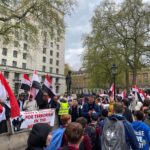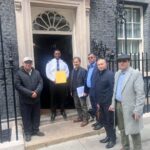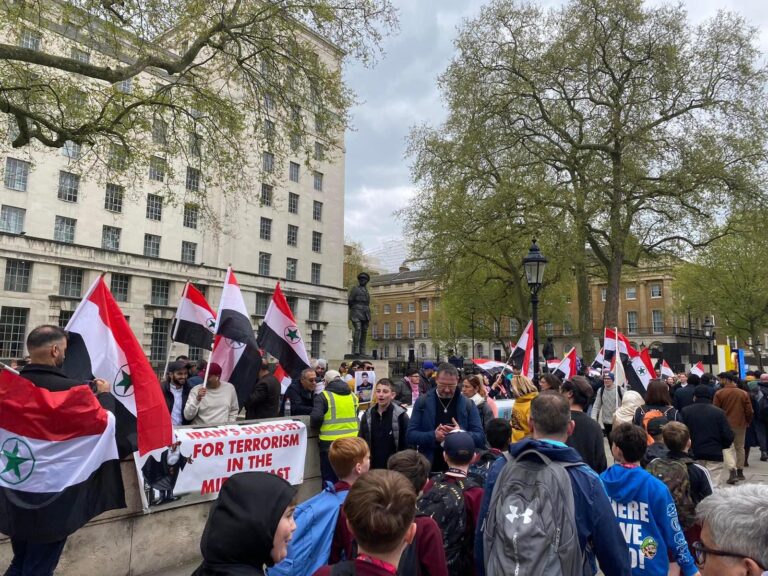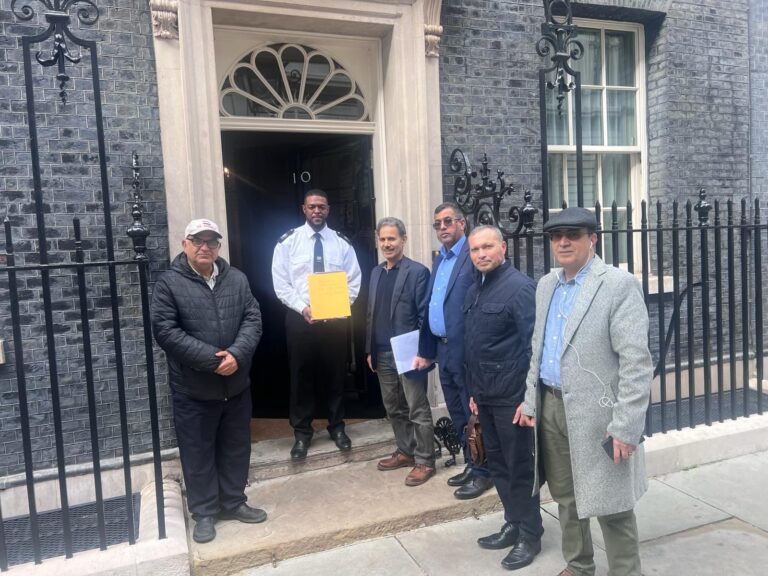World powers edge closer to Gaddafi solution
Forces loyal to Libyan leader Muammar Gaddafi were massed near the Tunisian border on
Tuesday, residents said, and the United States said it was moving warships and air forces closer to Libya, as Libyan protesters planned more demonstrations under the title “Day of Honor” across the country. Suspicions grew that the veteran leader, in power for four decades, does not understand the strength of the forces now massed against him, raising fears that one of the bloodiest Arab revolts may become more violent still. Western nations prepared to ramp up further pressure to prevent a full-blown catastrophe in Libya where strongman Gaddafi said his followers were ready to die to save his regime. Residents feared pro-Gaddafi forces were preparing an attack to regain control of Nalut, about 60 km (38 miles) from the Tunisian border in western Libya, from protesters seeking an end to Gaddafi’s rule.
|
|
||
|
Libyan leader Muammar Gaddafi
|
||
Crisis on borders
The U.N. refugee agency said that the situation on Libya’s border with Tunisia is reaching a crisis point after 70,000 to 75,000 people fled from the violence in Libya since Feb. 20.
“Our staff on the Libya-Tunisia border have told us this morning that the situation there is reaching crisis point,” said Melissa Fleming, spokeswoman for the U.N. High Commissioner for Refugees.
She said 14,000 people fled across the border to Tunisia on Monday, the highest number in a single day so far, and that 10,000 to 15,000 people are expected Tuesday.
Austria meanwhile, has frozen assets of Gaddafi’s family and other associates subject to European Union sanctions, the country’s central bank (OeNB) said on Tuesday.
“The OeNB states that around 1.2 billion euros ($1.66 billion) in Libyan assets are deposited in Austrian financial institutions. What part of this relates to people on the sanctions list still needs to be clarified,” it said in a statement.
The United Nations General Assembly votes on a resolution on whether to suspend Libya from the U.N. Human Rights Council later on Tuesday.
U.N. human rights chief Navi Pillay said “the threat of violent reprisals against civilians still looms” in Libya.
The United States and other foreign governments discussed military options on Monday for dealing with Libya as Gaddafi scoffed at the threat to his government from a popular uprising.
|
|
||
|
U.S. ambassador to the United Nations Susan Rice
|
||
Gaddafi “disconnected from reality”
U.S. ambassador to the United Nations Susan Rice said Gaddafi was “disconnected from reality,” was “slaughtering his own people” and was unfit to lead.
She said Washington was in talks with its NATO partners and other allies about military options. The United States also said about $30 billion in assets in the United States had been blocked from access by Gaddafi and his family.
The United States, whose Sixth Fleet operates out of Italy, said it was moving U.S. naval and air forces closer to Libya and working on contingency plans, including humanitarian assistance. Analysts said military action against Gaddafi was unlikely.
British Prime Minister David Cameron said his government would work to prepare for a “no-fly” zone in Libya to protect the people from attacks by Gaddafi’s forces.
Gaddafi rejected calls for him to step down and dismissed the strength of the uprising against his 41-year rule that has ended his control over eastern Libya and is closing in on the capital Tripoli.
“All my people love me. They would die to protect me,” he told the U.S. ABC network and the BBC on Monday.
He denied using his air force to attack protesters but said planes had bombed military sites and ammunition depots. He also denied there had been demonstrations and said young people were given drugs by al-Qaeda and therefore took to the streets. Libyan forces had orders not to fire back at them, he said.
Gaddafi, 68, looked relaxed and laughed at times during the interview at a restaurant on Tripoli’s Mediterranean coast.
Ambassador Rice called him “delusional.”
“It sounds just frankly delusional, when he can talk and laugh to an American and (an) international journalist while he is slaughtering his own people,” Rice said at the White House.
Uprising enters 3rd week
As the uprising entered its third week, the situation on the ground was often hard for reporters to assess due to the difficulties of moving around some parts of the desert nation and the patchy communications.
A Nalut resident, Sami, told Reuters by telephone: “They have surrounded the area near the Tunisian border … They came with heavy machine guns mounted on four-wheel drive vehicles and dozens of armed men equipped with light weaponry.
“They said they came to hunt down the thugs. But the people of Nalut are not buying this. Everybody is on alert for a possible attack by the same forces to retake the city.”
Another Nalut resident, who declined to be named, said he had heard Libyan soldiers had moved to the border with Tunisia. “There was no fighting in Nalut. They passed it and went to the border, around the area of Wazin. People do not know what will happen here,” he said.
Reporters on the Tunisia side of the border said Libyan army units appeared in the late afternoon on Monday and announced the frontier was now closed.
According to the witness the cities of Zliten, west of Misrata, and Gaddafi’s hometown of Sirte were still under the control of pro-regime forces.
There were reports that Libyan air force planes bombed ammunition depots in two separate locations south of opposition-held second city Benghazi on Monday.
Fighter jets hit munitions stores in the eastern town of Ajdabiya, around 100 kilometers (60 miles) south of the city, a witness told AFP by telephone. Two planes also attacked a munitions dump at Rajma, just south of the city, a military reservist said.
The government denied both attacks in a statement on state television.
On Monday, witnesses in Misrata, a city of half a million people 200 km (125 miles) to the east of Tripoli, and Zawiyah, a strategic refinery town 50 km (30 miles) to the west, said government forces were mounting or preparing attacks.
“An aircraft was shot down this morning while it was firing on the local radio station. Protesters captured its crew,” a witness in Misrata, Mohammed, told Reuters by telephone.
A battle for the military air base was also under way, he said. A Libyan government source denied the report.
A resident of Zawiyah called Ibrahim told Reuters by telephone that brigades commanded by Gaddafi’s son Khamis were on the outskirts of the town and looked ready to attack.
Armed militia
In Tripoli, Gaddafi’s last stronghold, several people were killed and others wounded on Monday when forces loyal to him opened fire to disperse a protest in Tajoura neighborhood, Morocco’s Quryna newspaper reported. The protest gathered close to 10,000 protesters, the Libyan newspaper said.
A doctor in the neighborhood later told Reuters protesters dispersed after seeing cars packed with armed militia.
Another Tripoli resident told Reuters by telephone there was a heavy security presence: “We are waiting for the chance to protest … We hope this will end soon but I think it will take much longer than anticipated,” he said.
In Tripoli, queues outside bakeries and soaring rice and flour prices fueled public anger. “There isn’t enough food,” said Basim, 25, a bank employee, adding many workers in the public sector had yet to receive salaries for February.
Crowds also massed outside state banks, which have started distributing handouts of about $400 per family in an effort by Gaddafi’s government to drum up support.
Foreign governments increased the pressure on Gaddafi to leave in the hope of ending fighting that has claimed at least 1,000 lives and restoring order to a country that accounts for 2 percent of the world’s oil production.
The U.N. Security Council on Saturday imposed sanctions on Gaddafi and other Libyan officials, imposed an arms embargo and froze Libyan assets. European Union governments approved their sanctions against Gaddafi in Brussels on Monday.
Fearing a bloodbath
Fearing a bloodbath after widespread reports of atrocities, more than 100,000 people have fled into neighboring Egypt and Tunisia over the past week, the U.N. said Monday.
More than 61,000 have crossed into Egypt, 40,000 into Tunisia and another 1,000 into Niger on Libya’s southern border, U.N. Emergency Relief Coordinator Valerie Amos told reporters at U.N. headquarters.
“I am very concerned about the alarming reports of continued violence,” Amos said, adding that information on the number of dead in Libya was difficult to obtain. “Estimates range from hundreds to thousands.”
Revolutions in neighboring Tunisia and Egypt have helped to ignite resentment of four decades of often bloody political repression under Gaddafi and his failure to use Libya’s oil wealth to tackle widespread poverty and lack of opportunity.
Regional experts expect rebels eventually to take the capital and kill or capture Gaddafi but say he has the firepower to foment chaos or civil war.
Opposition forces are largely in control of Libya’s oil facilities, which are mostly located in the east.
Industry reports suggested Libya’s oil output had been halved as expatriate workers pulled out, the International Energy Agency, said.













+ There are no comments
Add yours